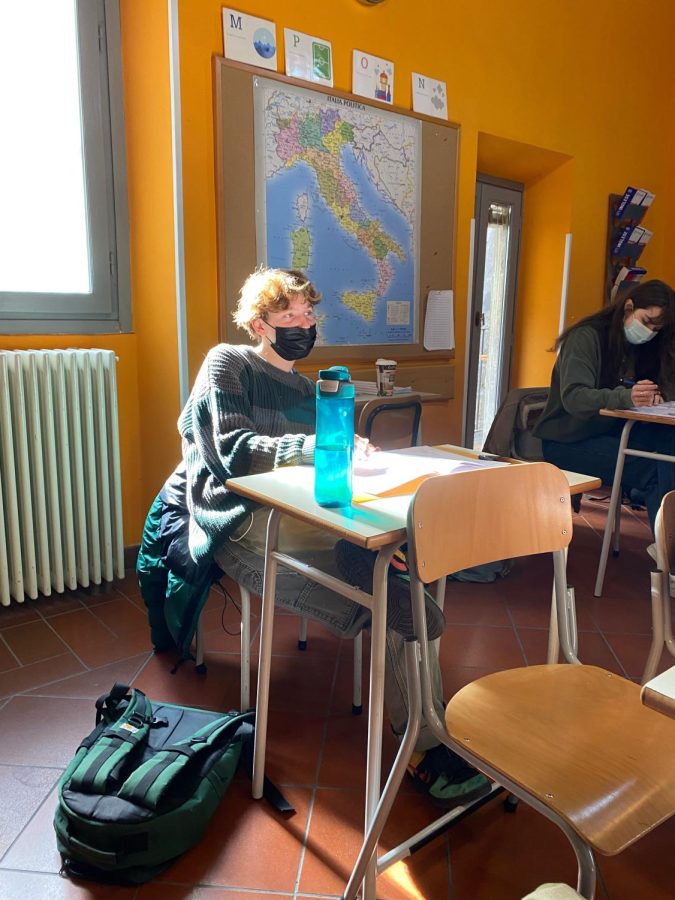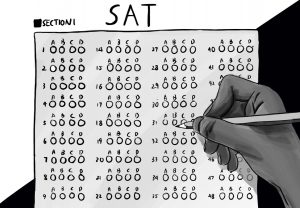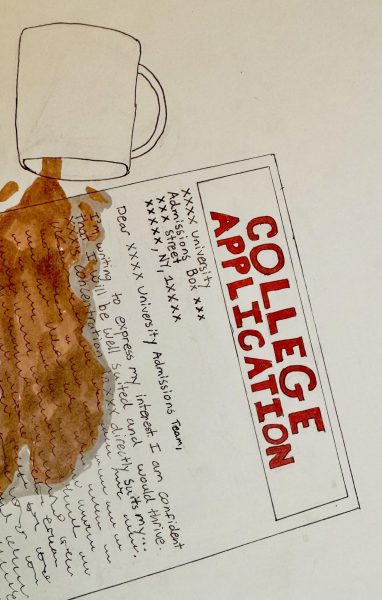Language requirement speaks with a forked tongue
Tara Phillips argues that Masters student’s experience abroad is not being acknowledged or appreciated by administration. Phillips studied abroad in Italy her junior year. Photographed above is formed Masters student Mac Alexander, in a classroom at School Year Abroad (SYA) in Viterbo, Italy
November 4, 2022
Masters encourages its students to have expansive academic experiences away from its New York campus. It has affiliations with different semester and year long study programs which students apply to. One of the more popular programs is School Year Abroad (SYA). Masters also has a language requirement stated on their website: “Languages: Three years of high school study, in the same language, through at least level III.”
Jennifer Hughes, a Spanish teacher at Masters encourages language studies abroad. “I strongly recommend studying abroad in High School. If you get the chance, do it! It is a fantastic opportunity,” said Hughes.
When studying abroad with SYA, I lived in Viterbo, Italy, with a host family for nine months. I was totally immersed in my environment. I lived with a local host family that only spoke Italian. I took two language classes. One focused on grammar and vocabulary; the other was based on culture. A majority of the students who attend SYA Italy reach a level 5 or 6 of proficiency.
Quinn Halprin, a current Masters senior and alum of SYA Italy said, “I wish Masters would make some sort of exception for students that study abroad and a language they haven’t studied prior. I think we should be allowed to pursue whatever language we come to find and really enjoy. I think Italian is a language that will benefit me in the future. I don’t think Masters should make its students feel constrained by its language requirements.” Halprin said she was upset to be taking Spanish at Masters. She feels proficient in Italian and wants to continue her studies to become even better at Italian outside of school. She added, “I feel like Masters is not taking into account my progression in a new language. They want me to pick up from the same place I left sophomore year, even though I have grown in other ways. They don’t understand or acknowledge that.”
Graduation requirements exist to ensure that students reach a level of proficiency in a range of topics. In the US, just 20% of students learn a foreign language. In parts of Europe it reaches 100%. Across the whole of Europe the median is 92%. Knowing another language is a necessary life skill. It pushes your brain to get familiar with new grammar and vocabulary. It trains your memory to recall different terms.
More importantly, it allows you to connect with another culture and build a global perspective. English speakers are privileged because the world caters to us, but we shouldn’t use that as an excuse to limit cultural contact. It is admirable that Masters helps promote language learning for its students. Although, it is also important that the school recognizes its students’ experiences and accomplishments.
Filippo Biscetti, a resident in Viterbo, the city that the SYA Italy campus is located, said, “In highschool I studied four different languages: English, Spanish, French, and Italian. I found studying many languages at the same time is useless. At the end of the day, you don’t learn one language.”
Biscetti said that learning many different sounds and grammar rules is confusing. “For example, I studied Spanish for eight years. I know a little bit. I studied French for five years and didn’t have enough time to master it. The scope of languages got confused in my mind. I wish my school allowed me to acquire proficiency in one language, rather than over teaching me. I only understand a small amount of many languages now.” said Biscetti.
Now, as a senior and proficient Italian speaker, I am required to take Spanish III at Masters. I feel as though I have surpassed the intention of the graduation requirement. Just because I chose to study abroad, does not mean I was no longer a Masters student. My junior year studies did not take place in Masters Hall, but learning was still happening. I wish my junior year studies contributed to my Masters graduation requirement. I also fear that taking Spanish this year will have an adverse effect on my language studies. I am concerned I will struggle in the class having not spoken or studied Spanish in over a year. Other students have been studying the language more constantly. But mostly, I fear it will interfere with my dedication to Italian.
























